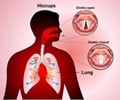
‘Most of the time hicupps are completely harmless, but, if you experience hiccups that last more than 48 hours this could potentially signal serious health complications.’
Tweet it Now
Hiccups happen when the diaphragm and respiratory organs experience a sudden, involuntary spasm. This spasm is usually followed by the closure of the glottis (the slit-like opening between the vocal cords and larynx) and a characteristic sound like that of a cough. Persistent hiccups are hiccups that last more than 48 hours but less than 30 days while intractable hiccups are classified as hiccups that last more than 30 days. Occasional hiccups are mostly harmless
Pfanner added, "Hiccups are normally seen in smokers and people who consume large amounts of alcohol. Anything that causes your stomach to become distended can cause hiccups. Smokers are prone because they are constantly swallowing air. Drinking alcohol can induce hiccups because it irritates the esophagus and may result in a flare-up of acid reflux."
Acid reflux disease is a common culprit behind hiccups, and surprisingly, ear infections may cause them as well. When the tempanic membrane (the membrane in the ear that vibrates in response to sound waves) becomes irritated this can result in hiccups.
Pfanner said, "This membrane can become irritated due to infection-especially if a hair makes its way into the ear and sits next to the membrane. This is a very common cause for hiccups that don't subside."
Advertisement
Pfanner said, "Generally, when someone is diagnosed with intractable hiccups, we start worrying that something more serious is going on internally. However, since intractable hiccups are also a symptom of acid reflux disease it's always important to discuss your symptoms with your physician."
Advertisement
Since hiccups convulse the muscles that control the diaphragm, patients who experience persistent or intractable hiccups can suffer nerve damage in the nerve that controls these muscles. "This may also point to a tumor in the neck or goiter," Pfanner said.
Pesky hiccups that refuse to subside may even be symptoms of heart muscle damage or a heart attack. Pfanner said, "Persistent or intractable hiccups can indicate inflammation around the heart or a pending heart attack. That's why we always want patients who are experiencing these type of hiccups to immediately consult their health care provider."
While hiccups can be tell-tale signs of serious health complications, common hiccups are more of a nuisance than a health risk.
To quickly ease your occasional hiccup woes, Pfanner recommends a few different methods. "You can hold your breath (for a short period of time) or breathe into a bag to ease hiccups. Other methods include putting a cotton swab in the back of the throat to induce a gag reflex, gargling with ice water, swallowing granulated sugar, biting a lemon and pulling your knees to the chest to compress it. Pressing lightly on the eyeballs will also activate your vagus nerve and result in a reflex that hinders the spasm of hiccups."
Source-Newswise










